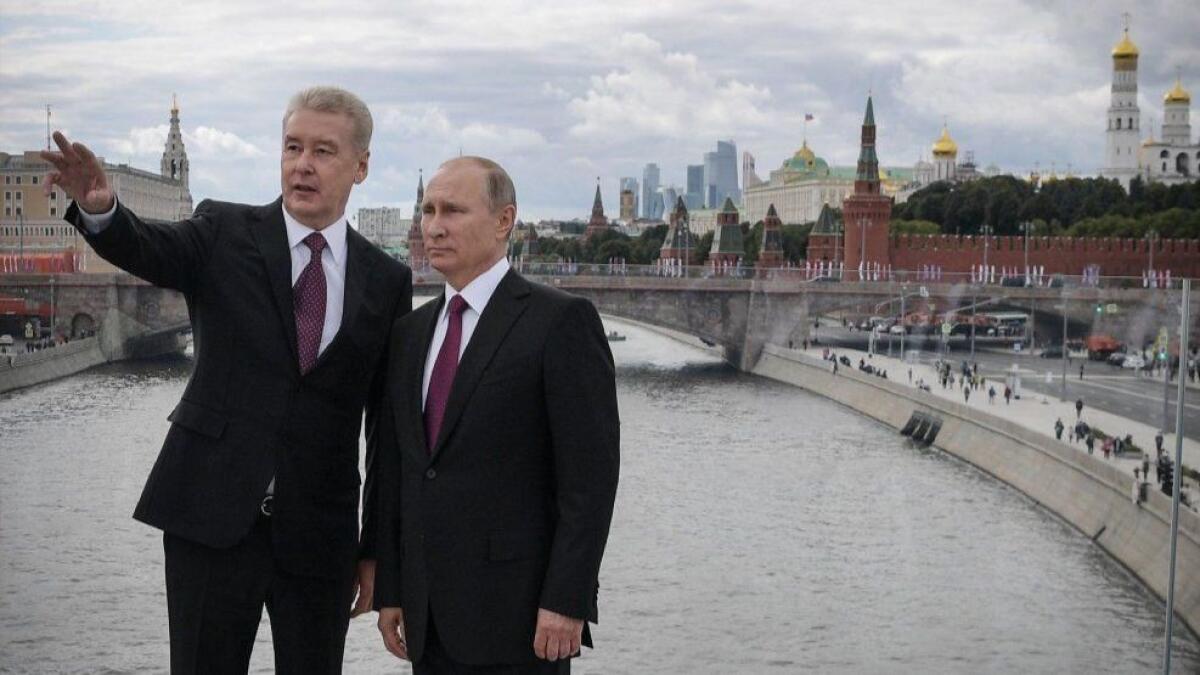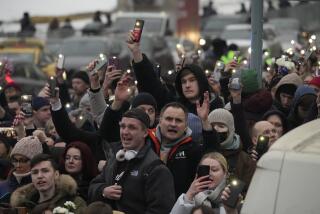Moscow mayor’s surefire reelection marred by public anger over proposal to raise retirement age

While Moscow Mayor Sergei Sobyanin, a key Kremlin ally, is poised to be reelected with no serious challengers Sunday, the real political test in this round of Russia’s regional elections appears to be President Vladimir Putin’s ability to stem growing public discontent over his proposed reforms.
As Russians across the country go to the polls to elect governors, mayors and regional legislatures, opposition leaders left off the ballots are calling for nationwide protests against a Putin-backed proposal to raise the country’s retirement age. The unpopular reform plan has driven Putin’s public approval rating down by 15 points since the proposal was introduced in June.
The discontent is the most serious to Putin’s rule since 2011, when hundreds of thousands demonstrated against voting fraud in his election to a third term.
Putin last month made a public plea on live television for Russians to accept the pension reform plan. The plan, which is currently making its way through parliament, would raise the retirement age from 55 to 60 for women and from 60 to 65 for men. Critics of the plan say it’s an attempt by the Kremlin to shortchange its citizens, since statistically few will live long enough to collect. The average life expectancy for Russian men is 67.
Sobyanin, 60, is a key figure in Putin’s circle of power. Moscow’s mayoral election is particularly important because of the Russian capital’s economic might.
But a low turnout could mar Sobyanin’s all-but-assured win. The city has countered the demonstration calls with a get-out-the-vote campaign that enlisted 10,000 volunteers. Posters around Moscow promised music, food and children’s activities at polling stations, and voting hours were extended to 10 p.m.
A former chief of staff for the Russian president, Sobyanin was appointed by then-President Dmitri Medvedev in 2010 to replace Yuri Luzhkov, who was dismissed amid allegations of corruption and that he ran Moscow like his personal fiefdom.
Sobyanin will face four other candidates on Sunday who are generally seen as “Kremlin approved.” None of them are polling higher than 14%.
Since his appointment, Sobyanin has overseen massive renovation projects that have changed the face of Europe’s biggest city to the tune of about $3.5 billion. Sobyanin supporters praise the mayor’s project to widen city sidewalks, repave streets and build new metro stations. Polls have shown his approval rating as high as 70%. His opponents accuse him of corruption, nepotism and silencing political opposition.
A recent public survey suggested that less than one-third of Moscow’s 7 million registered voters would turn out on Sunday. Another study by the independent Levada Center polling outfit found that 53% of Russians were ready to public protest against the proposed pension plan.
As with other elections, including Putin’s reelection to a fourth term in March, Russia’s disparaged opposition has been left off the ballot on Sunday. United Russia, Putin’s unofficial party, is expected to dominate the races across the country.
“This election is important only for the authorities, and more precisely, the attendance of the elections is important to the authorities,” according to Alexander Goode, 26, a Moscow designer who said he wasn’t planning to vote on Sunday. “It’s so that they can then show everyone how many people voted for the candidate for whom the government forces people to vote for without giving any choice.”
Looking to capitalize on public fury, opposition leader Alexei Navalny has called for demonstrations against the pension reform plan across the country on Sunday. The fact that he has chosen Sobyanin’s reelection day is no coincidence: Navalny scared the political establishment when he challenged Sobyanin five years ago in Moscow’s last mayoral election and received nearly 30% of the vote.
Since then, Navalny has become a thorn in the side of both Sobyanin and Putin. His demonstrations against what he claims is a Kremlin-orchestrated system of corruption in the country have drawn thousands of protesters to the streets. Hundreds have been arrested at the unsanctioned rallies. A fraud charge he said was politically motivated precluded Navalny from registering to run against Putin for president earlier this year.
A court last month sentenced Navalny to 30 days behind bars for organizing an unsanctioned protest in January, meaning the opposition leader will not be in attendance Sunday. On Thursday, Navalny’s team released a video on his popular YouTube channel accusing Sobyanin of financing a “troll factory” to promote his bid for reelection, among other transgressions.
“I do not plan to go to the protest, because to be honest, I do not see the point in this either,” said Margarita Kovalchuk, 29, an account director in Moscow who didn’t support Sobyanin and didn’t plan to vote on Sunday.
Despite not supporting Sobyanin politically, Kovalchuk credited him for Moscow’s new, green riverfront parks and extensive system of bike paths, which she likes. She has participated in protests since 2011, when Russia saw massive demonstrations against vote falsification during Putin’s election to his third term.
“I burned out,” she said in reference to Sunday’s protest. “Not because my opinion has changed, but simply because it is physically unpleasant to look at the fact that all your attempts and actions lead to nothing.”
Twitter: @sabraayres
Ayres is a special correspondent.
More to Read
Start your day right
Sign up for Essential California for news, features and recommendations from the L.A. Times and beyond in your inbox six days a week.
You may occasionally receive promotional content from the Los Angeles Times.







